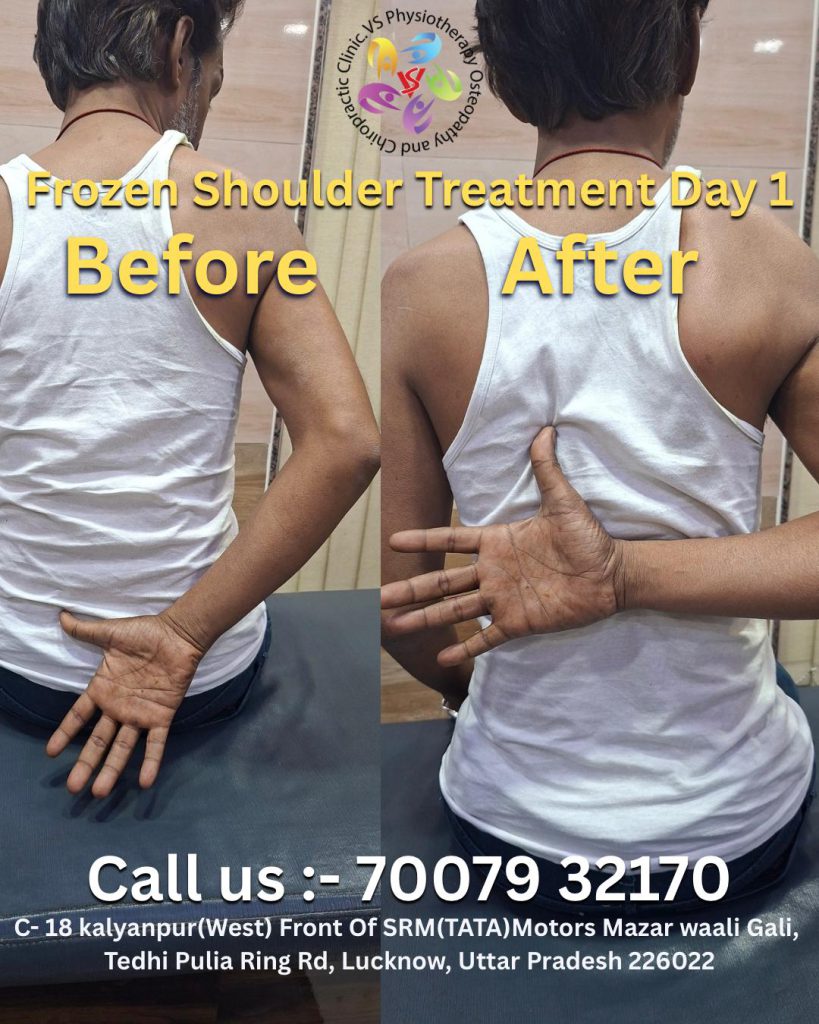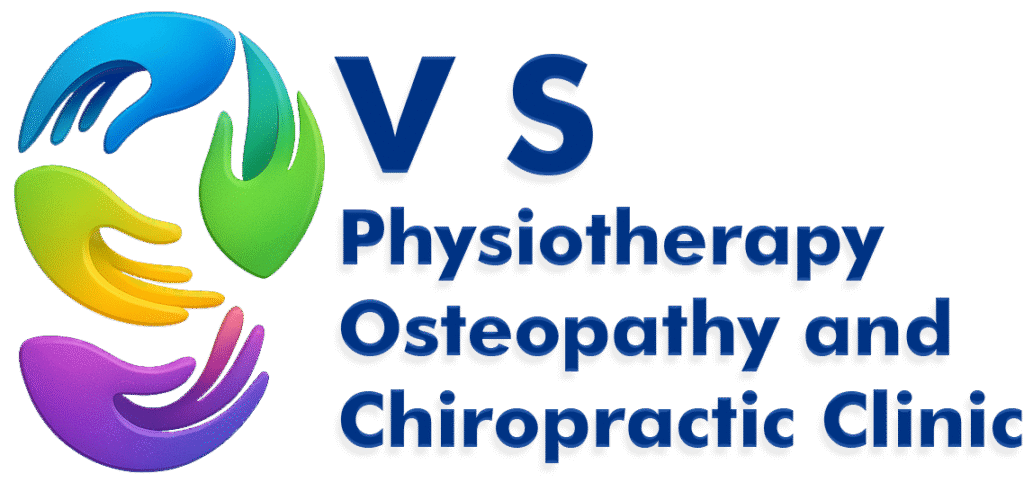Lucknow is a city that blends tradition with modern living. People spend long hours working in corporate offices in Gomti Nagar or Hazratganj, or managing small shops in Chowk and Aminabad. A large section of residents also commute daily on scooters, often on uneven roads like Tedhi Pulia or Ring Road. These lifestyle patterns put tremendous stress on the body.
Among the conditions linked to such routines, frozen shoulder has become increasingly common. This condition is also known as adhesive capsulitis. It often affects individuals in their 40s to 60s, particularly those with diabetes, sedentary habits, or past shoulder injuries. For many, the problem starts with mild stiffness, but gradually the shoulder loses almost all mobility.
Imagine a teacher in Aliganj who struggles to lift her hand to write on the blackboard, or a homemaker in Indira Nagar who cannot comfortably comb her hair. Frozen shoulder affects daily life in ways that people rarely expect until it happens.

Understanding the Problem – What is Frozen Shoulder?
Frozen shoulder occurs when the connective tissue surrounding the shoulder joint thickens and tightens. This restricts movement and causes pain. The exact cause is not always known, but it is often linked to prolonged immobility after injury, medical conditions like diabetes, or age-related wear.
Stages of Frozen Shoulder
- Freezing Stage
Pain gradually increases and shoulder movement becomes limited. This stage may last several weeks or months. - Frozen Stage
Pain may reduce slightly, but stiffness worsens. Activities such as reaching overhead, dressing, or carrying groceries become very difficult. - Thawing Stage
Gradual improvement in movement begins, but without treatment this stage can take several months to a year.
Common Symptoms
- Persistent pain in the shoulder joint
- Increasing stiffness that limits arm movement
- Difficulty sleeping due to shoulder pain
- Challenges with routine activities like driving, cooking, or dressing
- Pain that worsens in cold weather or during certain postures
In Lucknow, where many people use scooters daily or sit for long hours in offices, these symptoms can make daily routines especially difficult.
Value of Non-Surgical Solutions
The good news is that frozen shoulder does not always require surgery. Most cases improve significantly with structured physiotherapy, chiropractic care, osteopathy, and advanced therapeutic technologies.
Physiotherapy
- Gentle Joint Mobilization: Helps restore range of motion
- Pendulum and Stretching Exercises: Improve flexibility
- Electrotherapy (TENS, IFT, Ultrasound): Reduces pain and inflammation
- Strengthening Workouts: Focused on rotator cuff and shoulder muscles
Chiropractic Care
- Focuses on improving spinal and shoulder alignment
- Reduces pressure on nerves and improves posture
- Helps prevent recurrence by addressing the root cause
Osteopathy
- Uses soft tissue techniques to improve blood circulation and reduce stiffness
- Relieves muscle tension around the shoulder joint
- Enhances overall body balance, which helps long-term recovery
Matrix Rhythm Therapy
- A German innovation that uses gentle rhythmic vibrations at the cellular level
- Improves blood circulation and lymphatic flow in the shoulder region
- Reduces inflammation and promotes faster healing of stiff tissues
- Especially effective in chronic frozen shoulder cases where mobility is severely restricted
Super Inductive System (SIS)
- A state-of-the-art therapy that uses high-intensity electromagnetic fields
- Provides deep pain relief by stimulating nerves and muscles without direct contact
- Helps relax tight muscles around the shoulder joint
- Encourages natural tissue regeneration and accelerates recovery
These treatments are non-invasive and tailored to your unique condition. By combining hands-on therapies with advanced modalities like Matrix Rhythm Therapy and SIS, you can regain mobility, reduce pain, and avoid the risks of surgery.red to your unique condition. They help you regain mobility and reduce pain without the risks of surgery.
Evidence and Expertise at VS Physiotherapy
At VS Physiotherapy Osteopathy and Chiropractic Clinic, our team has helped hundreds of patients across Lucknow recover from frozen shoulder.
Case Study 1 – The School Teacher from Aliganj
A 42-year-old teacher could not raise her arm to write on the board. She underwent 10 weeks of physiotherapy with mobilization, stretching, and ergonomic advice. Today, she is pain-free and back to teaching without restrictions.
Case Study 2 – The IT Professional from Gomti Nagar
A 35-year-old software engineer faced severe stiffness after months of sitting at a desk with poor posture. With a mix of chiropractic adjustments and physiotherapy exercises, his mobility returned within 8 weeks.
Case Study 3 – The Homemaker from Indira Nagar
A 50-year-old homemaker had frozen shoulder linked to diabetes. Our integrated approach with osteopathy and physiotherapy helped her recover 80 percent mobility in 12 weeks. She now maintains her routine with home-based exercises.
Our clinic is rated 4.8 out of 5 by more than 200 patients on Google Reviews. Many have shared stories of how our non-surgical care gave them their life back.
Roadmap to Recovery
Frozen shoulder recovery does not have to be a long, drawn-out process. At VS Physiotherapy, our integrated use of physiotherapy, chiropractic care, osteopathy, Matrix Rhythm Therapy, and the Super Inductive System (SIS) allows most patients to recover within 2 to 4 weeks.
Week 1: Pain Relief and Mobility Activation
- Electrotherapy such as TENS or ultrasound to reduce pain
- Matrix Rhythm Therapy to stimulate cellular repair and circulation
- Super Inductive System sessions to relax shoulder muscles and decrease stiffness
- Gentle mobilization and posture correction
Week 2: Active Rehabilitation
- Pendulum exercises, wall walks, and assisted stretches
- Chiropractic adjustments to restore shoulder and spinal alignment
- Osteopathy techniques to release tight soft tissues
- Continued Matrix Rhythm Therapy for faster tissue recovery
Weeks 3–4: Strength and Long-Term Stability
- Strengthening of rotator cuff and scapular muscles
- Resistance band training for controlled shoulder movement
- SIS sessions to enhance neuromuscular activation and prevent recurrence
- Ergonomic and lifestyle training to maintain shoulder health
Timeline
- Mild cases: Noticeable relief within 1 to 2 weeks
- Moderate cases: Significant recovery in 3 to 4 weeks
- Severe cases: Require 4+ weeks but show clear progress with combined therapy
Prevention Tips for Lucknow Residents
- Take short breaks during desk jobs in Hazratganj or Gomti Nagar
- Do daily shoulder stretches before long scooter rides
- Maintain good posture at work and while using mobile devices
- Use ergonomic chairs with back and shoulder support
- Manage medical conditions like diabetes with regular check-ups
- Stay active with simple yoga or daily walks in parks like Ambedkar Park
Action – Start Your Recovery Today
Frozen shoulder can limit your independence and daily activities, but early treatment makes a big difference. At VS Physiotherapy, we combine physiotherapy, chiropractic care, and osteopathy to help you recover naturally and safely.
Call/WhatsApp: 070079 32170 for appointments
Visit: VS Physiotherapy Osteopathy & Chiropractic Clinic,
C-18, Kalyanpur (West), Opposite SRM (TATA) Motors, Tedhi Pulia Ring Road, Lucknow, Uttar Pradesh 226022
Book Online: www.lucknowphysiotherapy.com
Do not let frozen shoulder freeze your lifestyle. Take the first step toward pain-free movement today.
FAQs about Frozen Shoulder Treatment in Lucknow
Can frozen shoulder heal without surgery?
Yes, most cases improve with physiotherapy, chiropractic adjustments, and osteopathy. Surgery is needed only in rare cases.
How long does recovery take?
Recovery usually takes 2 to 4 weeks for moderate cases, but severe stiffness may take 3 to 6 months.
Is physiotherapy painful?
Treatments are gentle and tailored to your comfort. Mild soreness may occur initially, but it reduces as mobility improves.
Are home exercises enough?
Home exercises help maintain mobility, but professional treatment speeds recovery and prevents recurrence.
Who is at higher risk in Lucknow?
Middle-aged adults, diabetics, office workers with sedentary jobs, and those who ride scooters for long commutes.
